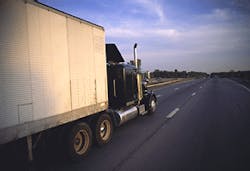Yesterday the U.S. Homeland Security Council released a national strategy for dealing with an influenza pandemic that positions trucking as a stakeholder. The report noted that the risk of transmitting the flu virus via cargo or trade goods is low, with the exception of live avian or other animal cargo.
However, the federal government has not ruled out significant border measures to slow the spread of flu should an outbreak occur.
The federal government estimates that “highly restrictive border measures” could delay the peak of a pandemic by a few weeks— but not prevent it.
“An outbreak of pandemic influenza abroad might result in other countries closing their borders and generate calls for similar action in the United States,” the report stated. “Outbreaks in Canada and Mexico might further increase pressure to close U.S. borders. Conversely, an outbreak within the U.S. might result in other countries closing their borders to the U.S. to delay spread.”
Disruptions of border crossings with Canada would affect manufacturing exports, particularly automotive. Importation of agricultural product and textiles would be impaired should border crossings with Mexico be impeded. Restrictions in cross-border commerce could cripple manufacturing plants that rely on exports and just-in-time delivery, added the report. Disruptions in maritime trade would have “immediate and significant economic impacts.”
Mobilizing the private sector
Government and health officials warn that businesses should prepare contingencies to combat a pandemic flu that may cause absenteeism of 30%, supply chain disruptions, and an overall GDP drop of 5 to 11%.
“[Trucking companies should develop] personnel contingency plans to keep your stock rolling,” Fletcher Hall, executive director of the American Trucking Assns.’ Agricultural Transporters Conference told FleetOwner. “Both ag and food commodities run 24/7. You have 80% of the national community depending on trucking to supply your basic food staples everyday.”
Additional federal measures to vet truck cargo for contamination is expected to be limited in any case said Hall.
“The USDA already does a stringent inspection, and they would obviously boost that,” Hall told FleetOwner. “And the integrated nature of our internal domestic [poultry and turkey] production already serves as a deterrent.”
The poultry industry, which has the greatest risk of contamination, has already taken solid voluntary measures to prevent bird-to-human transmission of flu as well as sanitary precautions, Hall added.
For more preparedness information, visit ATA’s pandemic section at www.truckline.com/pandemic/index.
